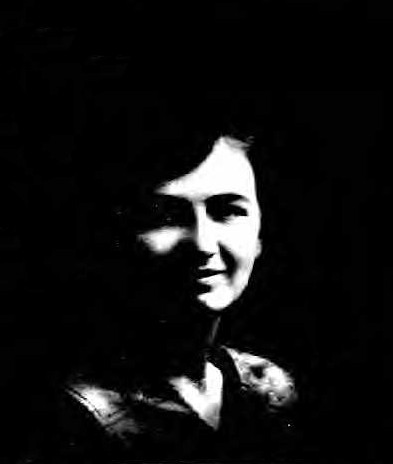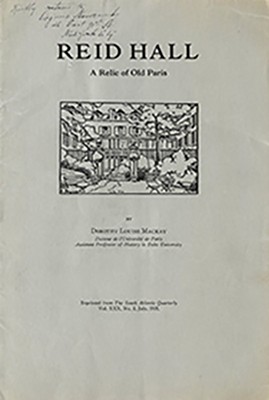Dorothy Louise Mackay, 1899 – ?

Dorothy Louise MacKay was born in San Francisco in 1899. She graduated from the University of California with a B.A. in 1918 and an M.A. in 1919. Her thesis, "L'Hôtel Dieu de Paris aux XIIIè siècle," describes its early history, administration and staff, patients, revenues, and buildings.
In 1921, she lived at the University Women's Club while studying at the University of Paris, where she earned a PhD in 1923. Her doctoral thesis, “Les hôpitaux de la charité à Paris au XIIIè siècle,” was published that same year (éditions Campion) and demonstrated that these individual hospitals, which were established to help pilgrims, the poor, and the sick, were a group of mutually-interrelated institutions that had a significant impact on daily life in medieval Paris (Bonenfant).

Mackay was awarded the European Fellowship of the American Association of University Women (AAUW) in 1931 and once again lived at the University Women's Club. She actively pursued her research not only on medieval charity and medical institutions, but also on Reid Hall's own history. Her article, "Reid Hall, A Relic of Old Paris," describes the early history of the the neighborhood and focuses on 4 rue de Chevreuse in the period between 1834 and 1893, when it served as a Protestant boarding school for boys, known as the Institut Keller. Her account also debunks the romantic legends that claimed the property was the epicenter of Marie de Rohan's intrigues and love affairs.
Having returned to US from Paris, Mackay was on the faculty of Mills College from 1923 to 1926, West Virginia University from 1926 to 1930, Duke University from 1930 to 1947, Goucher College from 1947 to 1948, and the University of Maryland from 1948 to 1949. She published numerous articles, many co-authored by her husband, William Rogers Quynn. Like many other women who taught at coeducational institutions, she faced serious obstacles:
Usually the only women in their departments, they were treated as inferiors and were subject to overt forms of discrimination. Dorothy Louise Mackay Quynn, who was employed at West Virginia University before she moved on to Duke University, believed she had to write a letter of apology to explain why she failed to show up at a luncheon given for fellow medievalist August C. Krey when he spoke at Duke in 1940: "I am almost never included in department gatherings of a professional nature, and am, I know, too sensitive on the subject ... I usually pretend not to hear remarks such as that made about "the luncheon given for Mr. Krey by the Department on Thursday" (Goggin 778).
Sources
- Bonenfant, Paul. "Dorothy-Louise Mackay, Les Hôpitaux et la Charité à Paris au XIIIe siècle," Revue belge de philologie et d'histoire, vol. 3, no. 4, 1924. pp. 920-921. Persée.
- Goggin, Jacqueline. "Challenging Sexual Discrimination in the Historical Profession: Women Historians and the American Historical Association, 1890-1940." The American Historical Review, vol. 97, no. 3, June 1992, pp. 769-802. JSTOR.
- Labande, L.H. "Dorothy-Louise Mackay. Les Hôpitaux et la Charité à Paris au XIIIe siècle, Revue critique d’histoire et de littérature, no. 17, September 1, 1924, pp. 347-348. HathiTrust.
- Mackay, Dorothy-Louise. “The Hôtel-Dieu of Paris in the thirteenth century.” M.A. Thesis, University of California at Berkeley, 1919. HathiTrust.
- Mackay, Dorothy Louise, Les hôpitaux de la Charité de Paris au XIIIe siècle. Paris: Champion, 1923.
- Mackay, Dorothy Louise, "Reid Hall, A Relic of Old Paris," South Atlantic Quarterly, vol. 30, no. 3, July 1931, pp. 260-271. RH archives.